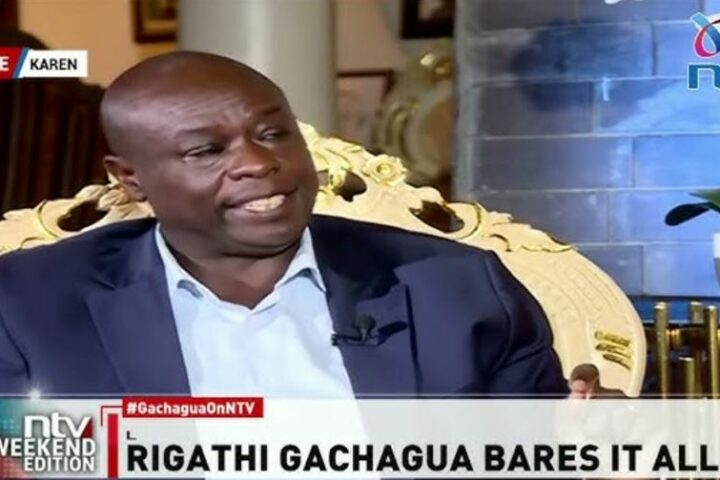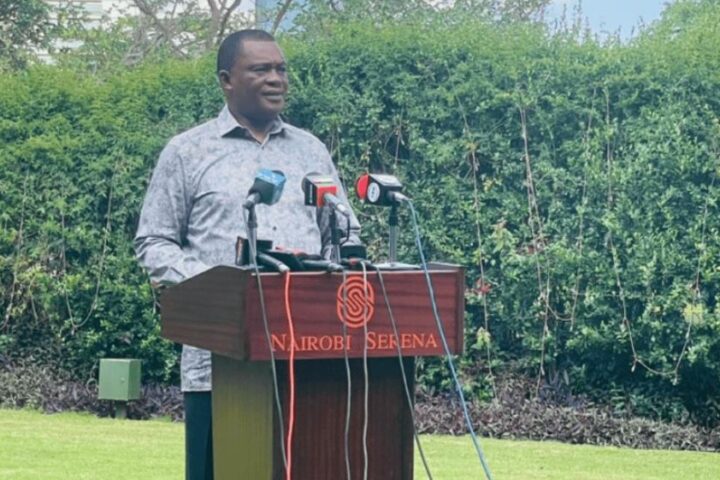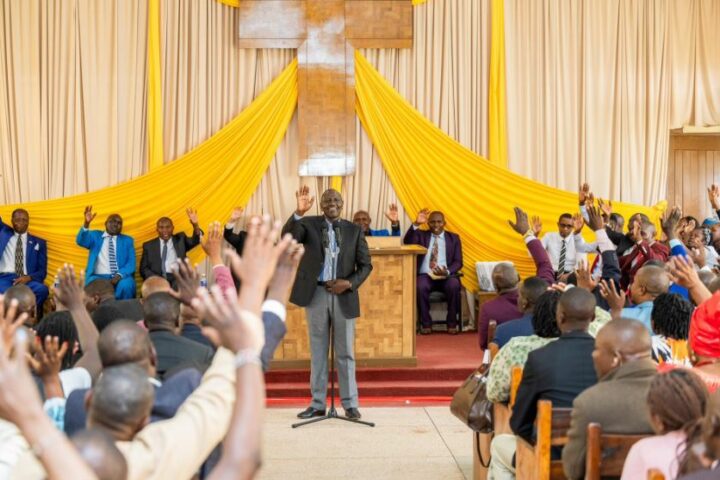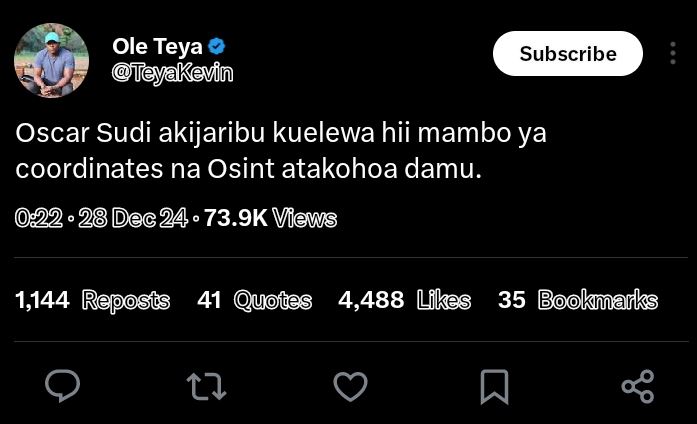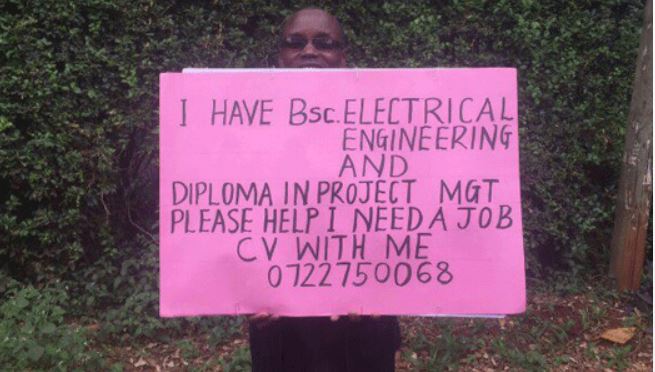
According to the KNBS survey, seven million Kenyans are unemployed. Out of these, 1.4 million have been desperately looking for work.
The rest are said to have given up on job hunting, with some opting to go back for further studies.
While premier companies receive thousands of applications from job seekers every year, research shows that these companies specifically target the top-of-the-range talent to exert and sustain their dominance in the market.
So what are some of the qualities some Kenyan companies look for? Four companies- Kenya Red Cross, EABL, NMG, and Safaricom revealed to myNetwork:
EAST AFRICAN BREWERIES LIMITED
What unique attributes does EABL look for in young graduates?
Our business operates in a highly competitive landscape and market dynamics of varying complexities. Through our Diageo’s Global Graduate Programme, we tap into the talent of young people with the ability to learn and adapt fast to deliver against the tide. We search for unique behavioural traits such as relentlessness and agility, entrepreneurial ability and boldness in execution of ideas, aspirational and purpose-driven self-starters. Our selection framework is rigorous, and we train graduates on the job before hiring them permanently.
What is unique about engaging millennials and how does EABL address this?
Millennials are almost twice as likely as older staff to list “future career opportunity” as a top attribute for a new job or while leaving current employment. For this reason, we allow graduates to have multiple roles within the organisation through frequent job rotations to give them different work experiences.
Millennials are much less engaged, such that only 26 per cent of them are determined to stay with the current employer. With this in mind, we keep them meaningfully engaged by reconstructing their projects and responsibilities, peers and networks to keep them stimulated.
Eighty per cent of millennials seek upward movement within their first five years of working. In light of this, we encourage their line managers to provide future-focused performance feedback to their millennial population during performance reviews and development conversations.
Most of our graduates chose a global company and global programmes expecting global rotation. They believe that international rotation allows them to see how other markets work, learn about best business practices across regions and to experience other cultures to be open-minded.
When this expectation is not met, they become disengaged and eventually less productive. We therefore clarify what opportunities exist, the commitment from the business and the criteria for participation, which translates to better engagement.
In what significant ways have millennials in your workforce contributed to the successes of your brand?
Some of our millennial pools have proved themselves within a very short time, delivering exceptional outcomes within the supply, marketing, sales, human resource and finance aspects of our business. EABL’s talent deal is a two-way arrangement where the organisation provides all the necessary resources while the individual is expected to exploit them to deliver results. The success of this model serves as an assurance that we are investing in the right people to drive our goals while developing the best professional talent.
How should young people who wish to work for EABL package themselves?
You must think “outside the bottle” and be ready to constantly reinvent yourself to stay relevant and in pace with the volatile, uncertain, complex and ambiguous (VUCA) landscape in which we operate. We engage young people who are stimulated to join us, proud of what we stand for, moved by our vision and are motivated to stay with us to position our brand more effectively across the market.
SAFARICOM
Do you have a graduate programme or a millennials engagement policy?
We started the Graduate Management Engineers (GME) in 2006, a programme that was strictly designed for engineering graduates.
The success of GME motivated us to start Safaricom Discover Graduate Management Programme in 2014, hoping to reach out to young talent in other professions.
We recruit 20 university graduates annually, who we then introduce into the diversity of our business for a period of 18 months, to equip them with valuable professional skills such as planning, strategy execution, people skills, and, more personally, how to budget their salaries. So far we have trained 60 graduates, some who we have hired.
What unique talents does Safaricom look for in potential recruits?
We look for bright, passionate, well-rounded individuals who have the potential to grow into business leaders. The individuals must demonstrate personal drive, applied thinking, be change agents and have the ability to engage wider groups of people at all levels of our organisation hierarchy.
How do you motivate your youthful employees to keep them engaged at work?
Ours is a flexible workspace that encourages free interaction and fun at work, with access to gym facilities and break out areas for recreation. We also offer an attractive benefits package that includes flexible work hours, as well as job rotation opportunities, internal networks of coaches and mentors and youth leadership development programmes.
How do you address issues of detachment and distractions that are common among this age group?
We are cognisant of the fact that millennials are the most overstimulated demographic when it comes to the modern workplace, thanks to the abundance of devices vying for their attention, which has a significant effect on their output. One key pillar of our organisational culture is what we call “100 per cent human at work”, where we encourage employees to be more conscious about living lives with balance, such that work and electronic devices do not take the place of meaningful human interactions.
Furthermore, we have robust job rotation and e-learning programmes that challenge the youth to grow personally and professionally.
We are also constantly on the lookout for opportunities to grow them within the business, so that they can come to work with the desire to pursue more than just a pay check.
What is the composition of young people within your workforce and how has this improved your fortunes as a telecommunications business?
Millennials constitute 69 per cent of our workforce. We have benefitted immensely from the energy and fresh perspectives they have brought to the workplace. Millennials are not only ambitious, but also eager to learn, to push boundaries and to create and adopt new technologies. This has allowed us to create the culture of innovation at Safaricom.
We encourage our young employees to share their innovative ideas through a staff portal. Consequently, some of the ideas shared have been developed into products and services now available to our subscribers.
What are the common mistakes that young people looking for jobs with you make?
Most young job seekers submit hurriedly assembled application documents instead of a well-detailed résumé and cover letter with accurate information. These two form the basis for shortlisting. Candidates should, therefore, take time to prepare a neat résumé that reflects their qualifications and work experience. Integrity is a vital attribute that we look for.
There’s the saying that failing to prepare is preparing to fail. Sometimes candidates come for interviews without preparing adequately. Simple factors such as reading about your potential employer’s history could influence whether or not you get that job. Candidates should prepare well, and be punctual for interviews.
What key lessons have you learnt in your engagement of the youth?
Young people have an abundance of amazing ideas. But meeting some of their expectations at the workplace is sometimes challenging. Millennials’ approach to work may be different, but they’re just as committed as the older generation, to working smart to deliver great results. The best way to handle them is to tap into their energies and aspirations by accommodating their needs and preferences at work, working closely with them and trusting them to make the right decisions.
How do you balance between your work policy and your young employees’ preferences at work?
We listen to their ideas and refresh our policies to reflect and balance their wishes and the interests of our business.
We understand, for instance, that everyone needs an occasional break from work, and that some people prefer to squeeze a workout or foosball in between work. We, therefore, provide the right facilities to that effect, and trust them to make the right decisions. We also allow our youthful employees to enjoy flexible work hours, to work from home or even a coffee shop, as long as they deliver the expected results.
Has this group influenced any significant change of culture at the organisation? In what ways?
Our culture has largely been informed by the fast-changing market dynamics as well as fast-changing employee profiles. Very few of our employees dress formally, for instance. It’s normal to see people wearing jeans and t-shirts every day of the week, to hear music from Bluetooth speakers all over the office and to see teams going for departmental movie dates, all which have formed part of our culture.
Address telecommunications students and graduates who wish to work with you in future.
Learn more about our core values of Speed, Simplicity and Trust and our vision of Transforming Lives. Keep up with the general macro–economic developments that impact our industry. We regularly advertise new opportunities, so be on the lookout for them. Apply.
KENYA RED CROSS SOCIETY
At what levels does the Red Cross Society of Kenya engage millennials professionally?
Millennials (those born between the early 1980s and 1990s) constitute the largest percentage of our volunteers. They are at the forefront of our humanitarian operations in Kenya.
Through the Kenya Red Cross Youth Engagement Strategy that runs in the 47 counties, we engage this group as community leaders – they are expected to exercise their unique skills to drive positive change in their communities, a platform that also provides peer-to-peer learning among themselves. We tap into specialised skills drawn from different professions including teaching, engineering and communication to build a strong buffer of ready help.
This way, we are able to respond to all types of needs countrywide. The flexibility of youth volunteers ensures that emergencies are responded to promptly and effectively.
We also engage millennials in the design, planning and delivery of programmes that directly affect their welfare to strengthen their professional skills and personal development.
The programme has also created a great platform for inculcating in youth the attribute of empathy and the best practices of humanitarian action.
How does Kenya Red Cross identify talent among young graduates?
We do so through occasional innovation challenges under the youth programme. We give young professionals an opportunity to pitch and develop creative youth-driven and sustainable solutions for challenges such as conflicts, flooding and drought that face their communities. We do this through collaborations and support from the staff, members and volunteers of the Kenya Red Cross.
Those whose ideas stand out are selected to work with us.
What would you say about the attitude of Kenya’s youth towards humanitarian activities?
Young people are the change makers and movers of any society. They have the capacity and willingness to offer their skills, knowledge and time to support and alleviate human suffering in their communities.
Kenya has a robust and bulging youth population, a demographic that is constantly looking for opportunities. Our youth programme, therefore, taps into the unique skills that the current youth bulge provides. Last year, more than 15 young people were awarded by the organisation for their community-based initiatives, such as volunteer teaching. Mohamed Faud, 26, from Lamu County, who won the Youth Volunteer of the Year Award, for instance, quit his teaching job to rehabilitate drug addicts in coastal counties.
Across Kenya, young people have demonstrated their commitment to community service as guided by the Kenya Red Cross’s four part youth programme, namely, protection of life and health, community service, dissemination of humanitarian principles and national and international friendship and understanding.
Being a volunteer-based organisation, are there specific attributes that you look for in potential volunteers?
We are guided by the seven fundamental principles of humanity, impartiality, neutrality, independence, voluntary service, unity and universality (HINIVUU).
Volunteerism is at the heart of the Kenya Red Cross, and our volunteerism is an all-inclusive programme open to all willing to offer their services to positively impact their communities.
We do not discriminate against anyone based on gender, religion, sex, race, disability, ethnicity or age.
NATION MEDIA GROUP
You interview hundreds of journalism graduates for jobs. What key qualities do you assess them for?
We conduct an aptitude test to assess the basics of journalism: scripting, video editing, sound and the ability to operate equipment such as cameras. The assumption is that a candidate who has been in media school should possess these fundamental skills.
For a media landscape where grounds are constantly shifting, we go for someone who is change-oriented. Media lifespan, especially on TV, is very short. We, therefore, evaluate the candidates’ ability to work on the digital, broadcast and print versions of our media (journalism 360); being multi-dimensional betters their chance of flourishing.
How specifically do you promote growth among your millennial employees?
After hiring them, we give them freedom to go into their creative space and to generate new ideas. You may assign someone a task, say, video-editing, but over time, they will naturally drift to the area where they feel more at home, say, news reporting.
The process is called talent differentiation. We support the recruits as they seek to find their space, but strictly within our editorial guidelines. This helps to minimise restlessness at work caused by doing what one is not passionate about. Thankfully, media production is diverse, and there’s a lot of room for millennials to thrive.
Poaching of talent is common in the media. What do you do to retain the best talent that you have developed internally?
Interns are our main talent pipeline, who we hire and train on the job. Occasionally, we send our journalists to media houses abroad to learn different styles of doing things. Such incentives develop in them a sense of duty to their organisation, making it harder for them to leave.
But when someone chooses to take on a new challenge elsewhere, we don’t block them, we make them feel comfortable about their decision, proud that we developed quality talent and happy that we are sending a good ambassador from our organisation.
How is the Nation Media Group adapting to workplace dynamics and what challenges has this trend brought?
It’s true that workplaces are changing fast, with millennials taking up central roles in most organisations. The impact has most been felt within the media space. Our front end (anchors and reporters) is mostly youthful, while the back office (administrators, engineers and technical crew) features the older generation.
We seek to balance between the two: exploiting the vibrancy of youth and experience of the older generation for maximum productivity. While the transition is naturally fixing, any foresighted modern company must be flexible enough to allow millennials to participate in shaping its culture.
